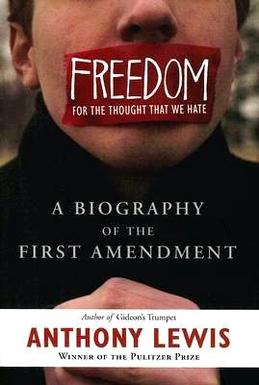Freedom for the Thought That We Hate facts for kids

Cover art of the original publication
|
|
| Author | Anthony Lewis |
|---|---|
| Cover artist | Cover: Brent Wilcox Jacket: Anita Van De Ven Jacket photo: Ken Cedeno |
| Country | United States |
| Language | English |
| Series | Basic Ideas |
| Subject | Freedom of speech – United States |
| Genre | Constitutional Law |
| Published | 2007 (Basic Books) |
| Media type | Hardcover |
| Pages | 240 |
| ISBN | 978-0-465-03917-3 |
| OCLC | 173659591 |
| 342.7308/53 | |
| LC Class | KF4770.L49 |
Freedom for the Thought That We Hate: A Biography of the First Amendment is a non-fiction book from 2007. It was written by journalist Anthony Lewis. The book is all about important freedoms in the United States. These include freedom of speech, freedom of the press, and freedom of thought. It also explains the First Amendment to the United States Constitution.
The book begins by quoting the First Amendment. This part of the U.S. Constitution says that the government cannot make laws that stop people from speaking freely or having a free press. Anthony Lewis explores how these important rights have grown in the U.S. over time. He looks at key historical events. He also talks about important court cases related to free speech. These cases were decided by the Supreme Court of the United States, which is the highest court in the country. Some of these cases include Schenck v. United States (1919) and New York Times Co. v. Sullivan (1964).
The book's title comes from a famous quote. It's from Oliver Wendell Holmes Jr., a Supreme Court Justice. He wrote that the most important idea in the Constitution is free thought. This means not just free thought for ideas we like, but "freedom for the thought that we hate." Lewis warns that governments might try to limit free speech. This can happen during times of fear or big changes, like after the 9/11 attacks. They might try to stop people from criticizing them.
Many people liked the book. Reviewers like Jeffrey Rosen from The New York Times gave it good reviews. Jeremy Waldron also wrote about the book. He disagreed with Lewis's ideas about free speech when it came to "hate speech." Waldron later wrote another book, The Harm in Hate Speech, where he discussed this more.
Contents
Understanding Free Speech and the First Amendment
This book helps us understand why free speech is so important. It shows how the right to speak freely has changed and grown in the U.S. over many years.
Protecting Our Right to Speak Out
A main idea in the book is a warning. When people are scared or there are big problems, governments might try to stop people from speaking freely. They might try to silence those who disagree with them. In an interview, Anthony Lewis explained this. He said that American politics has often used fear to control people.
For example, during World War I, laws like the Espionage Act of 1917 were used. People who protested against the government's actions were sent to jail for a long time. Lewis wrote this book to show how special civil liberties are in the U.S. These include freedom of speech and a free press. He also noticed that people's freedoms were sometimes reduced after the September 11 attacks.
The Power to Criticize Government
Freedom for the Thought That We Hate talks about how citizens can criticize their government. Lewis believes the U.S. has the most open speech rules of any country. Law professor Jeremy Waldron gave an example. He said he could criticize the president or call government leaders "war criminals." He would not be afraid of being arrested for saying such things.
The book compares today's free speech in America with earlier times. The author argues that civil liberties in the U.S. have grown over time. This is because Americans value freedom so much. Lewis points out that today, presidents are often made fun of or criticized. It's very unlikely that someone would go to jail just for speaking out against the government.
See also
 In Spanish: Freedom for the Thought That We Hate para niños
In Spanish: Freedom for the Thought That We Hate para niños
 | Madam C. J. Walker |
 | Janet Emerson Bashen |
 | Annie Turnbo Malone |
 | Maggie L. Walker |

